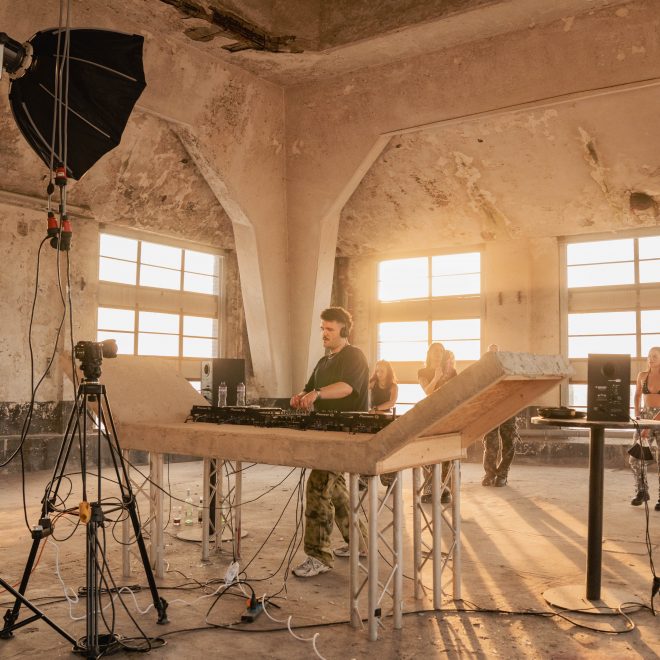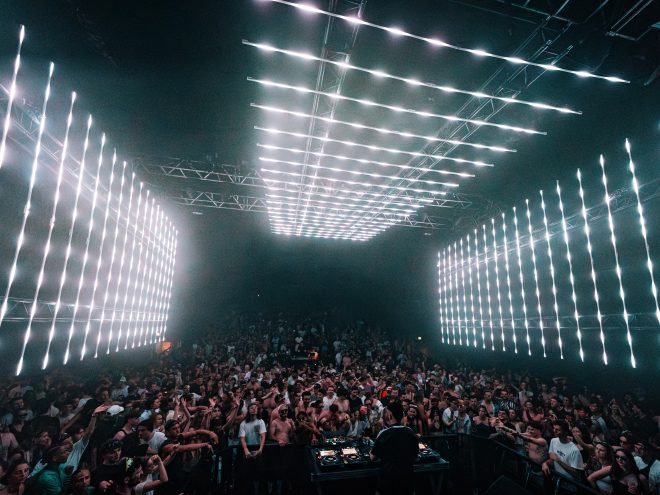Per Pleks: the warehouse as a compass

Warehouse culture has always been about rupture. Born in the late 70s as a rejection of disco’s polish and a reclamation of raw spaces, it was less about glamour and more about defiance, inclusivity, and sonic experimentation. Today, few artists embody that spirit with the same intensity as PER PLEKS. Restless and constantly reinventing, his approach to techno resists formula and thrives in risk.
“I get bored with my own creations very easily, so I’m naturally reworking and forging new and to me more exciting sounds and styles. Sometimes this means I start from scratch, recycle old projects, or get inspiration from music that was made a while ago.”
For PER PLEKS, reinvention is not just a branding exercise, but a matter of survival. It is the antidote to stagnation and the lifeblood of underground culture, a reminder that the warehouse spirit has always thrived on rupture, risk, and renewal. His trajectory is less about following trends than about bending them, reshaping his art in dialogue with both history and the present moment.
Generations and Safe Spaces
Much of his thinking revolves around how scenes evolve across generations. He is clear-eyed about the inevitable frictions.
“One of the biggest lessons I learned and also the relief I got from looking at the past is that there will always be a discussion between old and new generations of the same scene. Not everyone will like the art you do, and art is not meant to be liked by everyone.”
For PER PLEKS, inclusion is non-negotiable. He argues that underground culture must expand rather than contract, creating room for outsiders, experimenters, and the next wave of ravers. But he also sees how social media complicates that.
“Yes, you shouldn’t film at an event and invade a safe space for others to express themselves. That’s part of educating the new generation. However, I also see a lot of people online hating on a certain type of music or people by calling it ‘TikTok techno,’ which is the opposite of what techno stands for. Inclusion, tolerance, and respect should be the basic manners. That also counts for the older ravers when they look at the younger generation.”
Underground Roots, Commercial Scale
Like many of his peers, his gateway into electronic music was not a purist’s canon but a cultural explosion. “To me, it was the album ‘Scary Monsters and Nice Sprites’ by Skrillex.” That spark ignited a path into more complex, darker sounds, but also gave him perspective on how each generation enters differently.
Today, complex dance is the global trend. Festivals are increasingly dominated by big-budget productions, LED walls, and pyrotechnics that dwarf the scale of traditional underground venues. For PER PLEKS, this expansion is double-edged.
“This huge attention is a big benefit for many up-and-coming artists to grow and build a career. It also elevated the formerly underground sound from small venues to the world's biggest stages, featuring the best and most powerful production. This leads to a conflict between the original and trend-building parts of the scene, which cannot compete financially and production-wise with the big commercial events. Especially in the age of social media, the bigger the production, the more attention it receives.”
Techno as Politics
His view of global electronic culture is shaped by privilege and caution. “First of all, I feel blessed to be able to see and experience so many different and diverse parts of the techno scene worldwide. I personally feel that the one mutual language we all understand, no matter where in the world we are, is music.”
Yet he resists naïve idealism. He warns against the manipulations of online discourse.
“What really challenges me are politically motivated campaigns or cancel culture within the music scene, that is not based on facts or are used to gain publicity for their own benefit. Techno is and has to be political at any time, but the community should also be cautious of wrong-motivated campaigns.” For him, politics is essential, but so is discernment.
Discipline and Flow
PER PLEKS doesn’t romanticize inspiration. His process is built on daily practice.
“Creative flow is not linear from start to finish. It comes in waves, can stay for days, and then disappear for weeks. To me, the importance lies in showing up at the studio every day and starting to work on music, regardless of the creative flow. This teaches discipline but also makes room to learn new skills and improve on technical things you may not look at in a hyper creative phase.”
Trends, for him, are not threats but lessons.
“I love analyzing trending music and learn what made this stand out against all the other music that’s being released every day, and breaking down a track to its key elements and understanding the magic that made this specific track a trend can significantly improve one's music-making process. However, I do not follow a specific formula just to meet expectations. If a song works, it works. Trying to create music based on a specific formula limits your authenticity and ability to overcome your own barriers.”
In my opinion, this is one of the most revealing parts of the interview. It shows PER PLEKS as both pragmatic and idealistic, a rare combination in electronic music. Many artists either romanticize inspiration as something mystical or dismiss trends as “sellout culture.” He does neither. He treats creativity like training for a sport; you show up, build discipline, and trust that flow will come and go. At the same time, he looks at trends with curiosity instead of fear, which makes him sound both humble and sharp.
This duality, discipline without rigidity, openness without compromise, is what makes him stand out. It says a lot about why his music feels alive, never locked in one formula, but also never careless. It’s thoughtful, rooted in process, yet always open to surprise.
In performance, his philosophy is equally uncompromising.
“Catching the crowd’s vibe is a key skill here that is necessary to be able to build a set to match the room’s energy and lift it to the next level.”
Yet his vision goes beyond clubs and festivals. A confessed gear nerd, he has been experimenting with cameras and aesthetic filming in unique, often hidden spaces.
“Together with my team, I’ve built a concept of a DJ set in combination with aesthetic filming in very unique and unseen places.”
“The craft of DJing is more than pressing play or playing a set that’s planned from A to Z. It comes from selecting songs and bringing records to the event that people cannot find anywhere else besides your set. I select the tracks based on how they make me feel. My vision succeeded when I made people dance, everyone had a great time, and after the set they texted me about the track IDs.”

Local Inspirations, Political Echoes
Recent years have brought him to Kyiv, where the techno community persists despite the ongoing war.
“The Ukrainians are suffering from a war aggressor for so many years now, and still manage to have a supportive and living techno community. The people have so much positivity. This experience and the common global tension lead to some political hints in my upcoming tracks.”
That direct connection between lived struggle and sound underscores his conviction that techno must remain a political force.
“If you count yourself as part of the techno scene, you should be a political activist too. It can be on big topics around the world or just in small, day-to-day situations. Awareness, respect, and courage to stand up for others are key elements why the techno scene is so great and will be great even when mainstream trends move on.”
His reflection carries weight because it bridges two realities: the dancefloor as a sanctuary and the world outside it as a battlefield. The joy of a rave in Kyiv, despite war, is not escapism; it is a declaration that culture endures, and that resistance can be danced into being. For PER PLEKS, techno’s vitality depends on remembering this truth.
The Romance of Warehouses
“To me, the whole myth of the early age of electronic dance music is very fascinating and a huge inspiration as a musician, but also as part of the techno community. As someone who’s trying to change and shift my form of art constantly, I still feel a deep connection and respect for the roots of the music and the artists that were the pioneers of that music.”
This is not just aesthetics, but biography.
“I grew up and still live in an area based on steel production and coal mining, so within the warehouse rave aesthetic, I’m able to connect my core memories of driving through my hometown with the music I make and the vibes that I find the best.” The connection has become collaborative:
“My team and I have worked out a concept of a visual and audio experience within the most extraordinary places we can find and get access to. It’s worth keeping an eye on that in the near future.”
PER PLEKS’ words draw a clear line between discipline and freedom. For him, inspiration is not something to wait on but something to earn through daily practice. By showing up in the studio, even on days when the spark is absent, he creates the conditions for growth. Discipline, he argues, does not kill creativity; it sustains it, allowing him to be ready when inspiration strikes. In this way, his approach mirrors the larger ethos of techno itself: one that emphasizes structure and repetition, leaving space for sudden, transformative moments.
At the same time, he does not shy away from confronting the forces shaping today’s scene. From the rise of “TikTok techno” to the generational clashes between underground roots and commercial expansion, PER PLEKS insists on holding onto authenticity without dismissing the new. He sees trends as lessons rather than threats, opportunities to dissect what makes certain records resonate, while refusing to reduce his own music to formulas. For him, reinvention is not just marketing; it is survival, the lifeblood of underground culture.
And running through all of this is his conviction that techno must remain political. His time with the Kyiv rave community, thriving in the shadow of war, left a lasting impression. That lived struggle, combined with his own background in post-industrial landscapes, anchors his conviction that activism and awareness are non-negotiable components of culture. For PER PLEKS, the future of techno is not simply about sound; it is about respect, resistance, and the courage to stand for something, even as the scene shifts. That stance, more than any track or trend, is what keeps the warehouse spirit alive.


